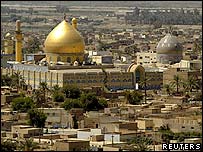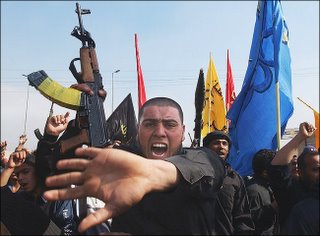Grand scale thuggery
Sunni insurgents dressed as police commandos blew up one of Shiite Islam's most  sacred shrines in Samarra early this morning.
sacred shrines in Samarra early this morning.

UPDATE:
 sacred shrines in Samarra early this morning.
sacred shrines in Samarra early this morning.The shrine is one of two tombs in Samarra for revered Shia imams, which attract pilgrims from around the world.
It was attacked one day after at least 22 people died when a car bomb exploded in a market in a Shia neighbourhood of southern Baghdad.
Large crowds quickly gathered outside the shrine to vent their anger.
Angry crowds also gathered in Baghdad, while many in the Shia holy city of Najaf called for revenge.
There were reports of disturbances in the Shia-dominated city of Karbala and in the southern city of Basra.
However, Ayatollah Sistani, who has consistently preached a moderate tone throughout the Iraqi conflict, urged Shias not to attack Sunni Muslims or their holy places.

UPDATE:
In the hours after the bombing, more than 60 Sunni mosques were attacked, burned or taken over by Shiites, said the Iraqi Islamic Party, the country's largest Sunni political group. The attacked mosques were mainly in Baghdad and predominantly Shiite provinces south of the country.
About 500 soldiers were sent to Sunni neighborhoods in Baghdad to prevent clashes between Shiites and Sunnis, and a leading A leading Sunni politician, Tariq al-Hashimi, urged clerics and politicians to calm the situation "before it spins out of control."
Other major Sunni groups joined in the condemning the attack. The Sunni clerical Association of Muslim Scholars called the bombing a "criminal act," while the Sunni Endowment, a government organization that cares for Sunni mosques and shrines, said it was sending a delegation to Samarra to investigate what happened.
Al-Sistani — the top Shiite cleric — sent instructions to his followers forbidding attacks on Sunni mosques, especially the major ones in Baghdad. He called for seven days of mourning, his aides said. But he later hinted, as did Iraqi Vice President Adil Abdul-Mahdi that religious militias could be given a bigger security role if the government is not capable of protecting holy shrines.
Shiite leaders in surrounding countries, including
Iran's most influential cleric body, the Qom Shiite Seminary, also responded quickly.
Large protests erupted in Shiite parts of Baghdad and in cities throughout the Shiite heartland to the south. In Basra, Shiite militants traded rifle and rocket-propelled grenade fire with guards at the office of the Sunni-led Iraqi Islamic Party. Smoke billowed from the building.
Shiite protesters later set fire to a Sunni shrine containing the seventh century tomb of Talha bin Obeid-Allah, a companion of the Prophet Muhammad, on the outskirts of the southern city, but there was no immediate word on the extent of the damage or any casualties.
Police found nine bodies of Sunni Muslims, most of them shot in the head, in two neighborhoods of Basra, according to a police official who spoke on condition of anonymity for fear of militia reprisals.
Protesters in Najaf, Kut and Baghdad's Shiite slum of Sadr City also marched through the streets by the hundreds and thousands, many shouting anti-American and anti-Israeli slogans and burning those nations' flags.
Elsewhere in the capital, about 40 Shiite militiamen sprayed a Sunni mosque in eastern Baghdad with automatic fire.


1 Comments:
No, not indefinitely. We might have our answer very soon. How is anyone going to prevent the militarization of each of these groups (independent of the government) now?
Seems out of the question.
Post a Comment
<< Home